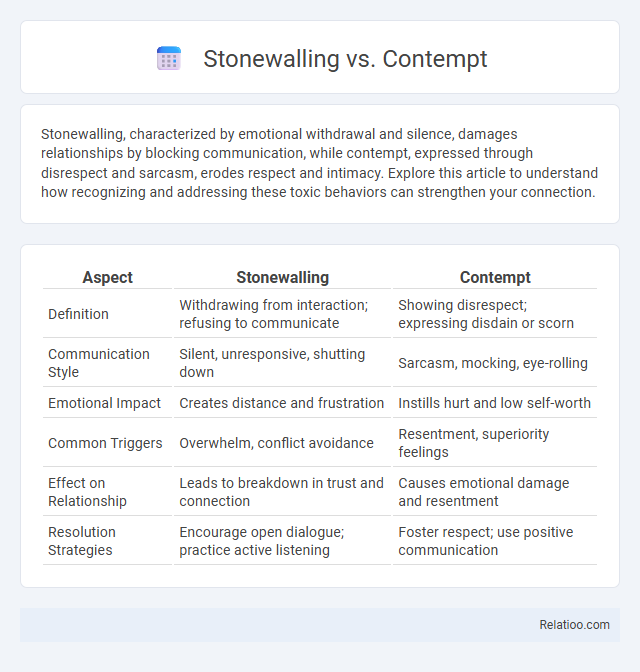Stonewalling, characterized by emotional withdrawal and silence, damages relationships by blocking communication, while contempt, expressed through disrespect and sarcasm, erodes respect and intimacy. Explore this article to understand how recognizing and addressing these toxic behaviors can strengthen your connection.
Table of Comparison
| Aspect | Stonewalling | Contempt |
|---|---|---|
| Definition | Withdrawing from interaction; refusing to communicate | Showing disrespect; expressing disdain or scorn |
| Communication Style | Silent, unresponsive, shutting down | Sarcasm, mocking, eye-rolling |
| Emotional Impact | Creates distance and frustration | Instills hurt and low self-worth |
| Common Triggers | Overwhelm, conflict avoidance | Resentment, superiority feelings |
| Effect on Relationship | Leads to breakdown in trust and connection | Causes emotional damage and resentment |
| Resolution Strategies | Encourage open dialogue; practice active listening | Foster respect; use positive communication |
Understanding Stonewalling: Definition and Signs
Stonewalling is a communication barrier where one partner withdraws from interaction, often exhibiting silence, avoidance, or refusing to engage in discussion. Key signs include emotional detachment, minimal verbal responses, crossed arms, and lack of eye contact, indicating a shutdown in communication. Unlike contempt, which involves overt disrespect, and stonewall, a noun referring to the act of obstruction, stonewalling specifically describes the behavior of emotional withdrawal in relationships.
What is Contempt? Exploring the Core Behaviors
Contempt is characterized by disdain and disrespect, often conveyed through sarcastic remarks, eye-rolling, or hostile humor that belittles the other person's worth. Core behaviors of contempt include insulting language, mockery, and body gestures aimed at conveying superiority or disgust. Understanding these actions helps you recognize destructive patterns that undermine healthy communication and damage relationships.
Psychological Roots: Why Stonewalling and Contempt Occur
Stonewalling and contempt often emerge from deep-seated emotional defenses rooted in fear, frustration, and unresolved interpersonal conflicts. Stonewalling, characterized by emotional withdrawal and refusal to engage, typically arises as a protective mechanism against perceived overwhelm or vulnerability. Contempt reflects underlying feelings of superiority and disdain, often fueled by persistent resentment and negative communication patterns within relationships.
How Stonewalling Undermines Communication
Stonewalling undermines communication by creating emotional distance and blocking constructive dialogue, often leading to frustration and unresolved conflicts. Unlike contempt, which conveys disdain through hostile language or body language, stonewalling manifests as silence or withdrawal, making it difficult for partners to engage meaningfully. Persistent stonewalling disrupts trust and intimacy, escalating misunderstandings and deteriorating relationship quality.
The Toxic Effects of Contempt in Relationships
Contempt in relationships erodes emotional bonds by signaling disdain and superiority, leading to increased conflict and decreased trust. Research shows contempt is a strong predictor of relationship dissolution, as it fosters resentment and emotional withdrawal. Unlike stonewalling, which involves silent avoidance, contempt actively undermines the partner's self-worth, making it uniquely destructive in long-term relational health.
Stonewalling vs Contempt: Key Differences
Stonewalling involves withdrawing from communication and refusing to engage, often as a defensive mechanism, while contempt expresses open disdain or disrespect toward another person, frequently through sarcasm or eye-rolling. Your understanding of these behaviors is crucial, as stonewalling typically signals emotional shutdown, whereas contempt damages relationships by attacking a partner's character. Recognizing these distinct patterns helps in addressing communication breakdowns and fostering healthier interactions.
The Impact of Stonewalling and Contempt on Mental Health
Stonewalling and contempt significantly harm mental health by fostering emotional isolation and intensifying feelings of rejection within relationships. Stonewalling, characterized by emotional withdrawal and refusal to engage, leads to increased stress, anxiety, and depression as individuals feel unheard and disconnected. Contempt, marked by disdain and disrespect, exacerbates psychological distress by eroding self-esteem and trust, ultimately contributing to chronic emotional pain and deteriorating mental well-being.
How to Recognize Stonewalling and Contempt in Yourself and Others
Recognize stonewalling by noticing when you or others withdraw from conversations, avoid eye contact, or give monosyllabic responses, signaling emotional shutdown. Contempt often appears as sarcasm, mocking tones, or hostile body language, indicating disrespect and superiority in communication. Your awareness of these behaviors can improve emotional intelligence and foster healthier interpersonal dynamics.
Strategies to Overcome Stonewalling and Contempt
Overcoming stonewalling requires active strategies such as practicing self-soothing techniques, setting clear communication boundaries, and scheduling regular, calm conversations to prevent emotional flooding. Addressing contempt involves cultivating empathy, expressing appreciation regularly, and reframing negative thoughts to break patterns of disrespect and build mutual respect. Implementing these approaches fosters healthier relationships by reducing emotional barriers and promoting constructive dialogue.
Building Healthy Communication to Prevent Relational Damage
Stonewalling, contempt, and stonewall represent critical barriers to building healthy communication in relationships, often leading to emotional distance and relational damage. Recognizing stonewalling involves identifying emotional withdrawal and refusal to engage, while contempt manifests as disrespect and disdain, both severely undermining trust and connection. Addressing these behaviors through active listening, empathy, and constructive dialogue fosters mutual respect and resilience, preventing long-term harm and promoting relational well-being.

Infographic: Stonewalling vs Contempt
 relatioo.com
relatioo.com